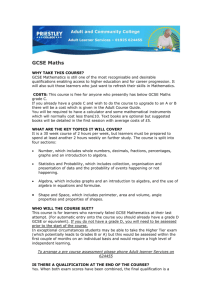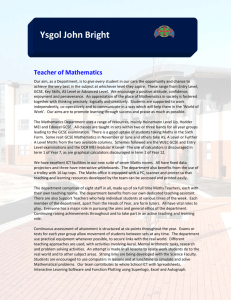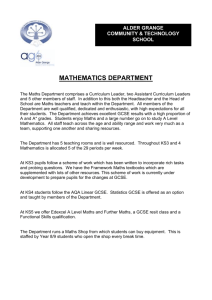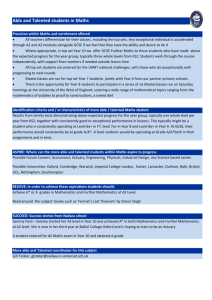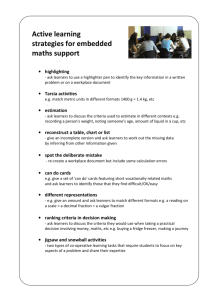Contextualising post-16 GCSE Mathematics: a toolkit About the toolkit
advertisement
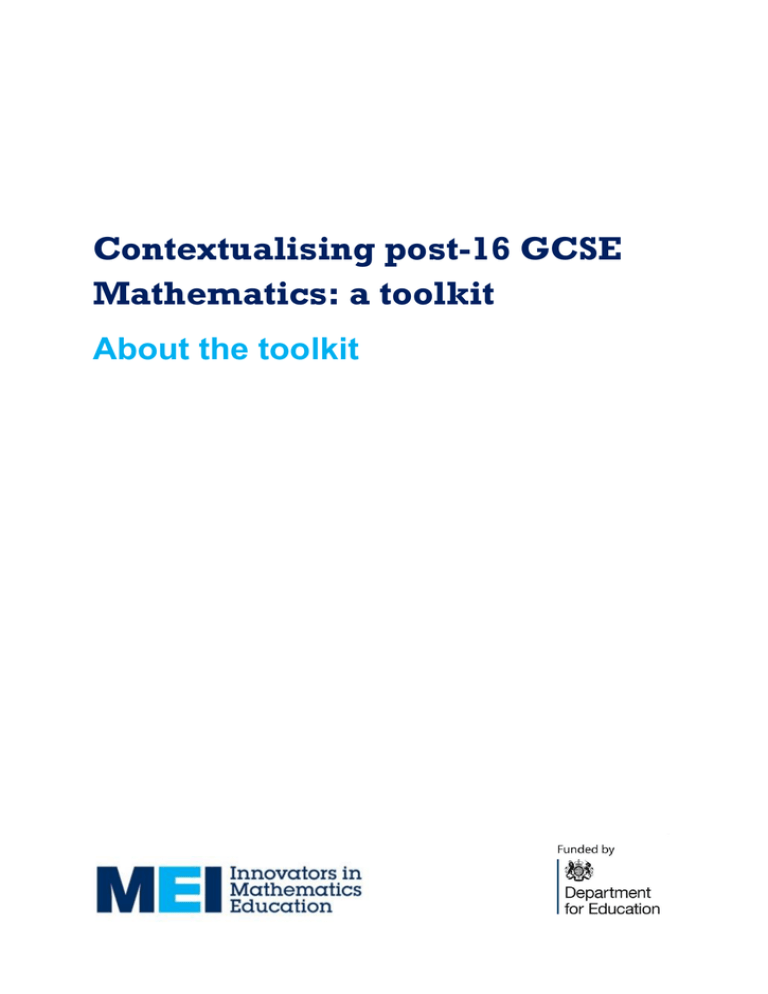
Contextualising post-16 GCSE Mathematics: a toolkit About the toolkit Introduction This toolkit has been developed for teaching practitioners involved in planning and delivering the maths elements of 16 to19 Study Programmes - both specialist maths teaching practitioners and vocational teaching practitioners who wish to embed maths in their delivery. One of the key features of 16-19 Study Programmes is an expectation that learners who have not achieved grade C or better in GCSE Mathematics will continue to work towards achieving it. The journey to this goal can help learners to develop skills that will be directly applicable to their future work and life experiences. Achieving this goal can also open doors to employment opportunities that would otherwise not be attainable, as GCSE Mathematics is a qualification that is well recognised by employers and transferable across all sectors. Most learners who have failed to achieve grade C or better in GCSE Mathematics, however, feel very negative at the prospect of continuing to study maths post-16. They often suffer from low levels of confidence in maths and may feel a sense of failure, so that learning maths becomes more challenging. These learners need a fresh approach distinct from the way they were taught in school, ideally one that helps them to see a clear line of sight from the maths they need to learn to the workplace. Teaching and learning maths in contexts that relate directly to a learner’s vocational studies, work experience or home life, can help learners to feel maths is less threatening, as well as making it more meaningful to them. This can help learners to develop a more positive attitude to maths and a deeper and more sustained understanding of mathematical concepts. This toolkit has been developed to encourage you to make greater use of context your delivery of post-16 GCSE Mathematics. It aims to support you developing and using your own contextualised resources. It also encourages you to share these resources with others, and to adapt and use those that others have developed. Why contextualise? Using vocational contexts in teaching GCSE Mathematics to post-16 learners can help them re-engage with maths. In addition to increasing their chances of GCSE success, this can also improve their ability to use appropriate maths in their work and home life. Contextualised resources not only support the teaching of maths in maths-focused lessons, but can also help vocational teaching staff to embed maths teaching into the vocational aspects of Study Programmes. This approach reinforces maths learning and helps to give learners the best possible chance of success. This approach is widely recognised as effective practice and is encouraged by Ofsted. Using context can be particularly effective in engaging learners early on in their programmes of study; however, at some point it is necessary to move towards pure maths in order to prepare learners for their examinations. Indeed there are some topics in GCSE Mathematics that are not easily contextualised. For this reason, in addition to guides and exemplar resources to help you to make greater use of contextualisation, the toolkit also contains a guide on preparing learners for examinations. 1 12/03/2015 Final version Why GCSE Mathematics? The Skills Company The Skills Company is a not-for-profit training provider based in Greater Manchester. It is one of the largest providers of Apprenticeships and Traineeships in the North West and also caters for learners following Study Programmes. The Skills Company offers Functional Skills Mathematics up to Level 2 and is in its second year of delivering GCSE Mathematics. Learners currently undertaking GCSE Mathematics range from school leavers to adults wishing to undertake Apprenticeships for which a grade C is an entry requirement. To study GCSE Mathematics learners are required to either be school leavers with a grade D, or to achieve a Level 2 in their initial assessment. All learners also undertake a mock foundation paper and, ideally, achieve a minimum of grade D. Last year all learners undertook the Foundation paper with AQA in which they can achieve up to a C. This year The Skills Company is consider entering some learners for the Higher paper, where is it considered that grade B or better is achievable. Crackerjack Training Crackerjack Training is a private training company based in the West Midlands with over 500 students studying a range of Childcare qualifications. Whilst many contextualised resources have been developed for Functional Skills there are fewer contextualised materials designed for GCSE Mathematics. Where contextualised resources for GCSE Mathematics do exist, they have generally been designed with prerather than post-16 learners in mind. How the toolkit was developed It was decided that the toolkit should focus on some specific context areas in order to exemplify how the approach could be applied to a broader range of contexts. These areas were: Construction and the built environment Health, social care and childcare Business, administration and entrepreneurship General life and personal interests The first two were selected because the vocations attract large numbers of learners who are yet to achieve grade C or better in GCSE Mathematics. The last two were selected because they have some relevance to all vocational learners. In developing the toolkit MEI worked closely with four different providers, each working on one of the four context areas: Skills Solutions: Construction and the built environment Crackerjack Training: Health, social care and childcare Barking and Dagenham College: Business, administration and entrepreneurship Skills Plus: General life and personal interests Their qualifications range from Level 1 Study Programme for 16-19 year olds, Level 2 Traineeships and Level 2/3 Apprenticeships in Childcare. They currently work with over 500 employers in a variety of settings; day nurseries, schools, pre-schools and before and after school clubs. Crackerjack Training currently employs 35 practitioners, and has recently become an AQA GCSE centre. The grid and guides included in the toolkit were initially developed by MEI. They were reviewed by teaching practitioners from the four providers. Each provider then used these tools to help them develop a set of exemplar resources for their particular context area. The exemplar resources were reviewed by MEI and then trialled by the providers. This involved several practitioners using them with 2 12/03/2015 Final version different groups of learners. The practitioners also used the draft toolkit to help them develop their own resources from scratch. During the development phase the draft toolkit was presented at four of the Association of Employment and Learning Providers’ Sector Forum meetings and as a result further providers offered to review the toolkits. Feedback gathered from all of these sources, including the learners who participated in the trials, was used to improve the toolkit. The college has over 5000 students enrolled on a range of part-time and full-time courses ranging from Entry 3 to Level 3 and above. Students studying vocational programmes complement their studies by also working towards qualifications in maths and English. In the last three years the GCSE Mathematics cohort has grown from a small number of part-time adult learners to over 300 full-time vocational and part-time students. Classes of approximately 15-20 students are delivered by subject specialists. Viability for GCSE is determined at the start of the academic year through consideration of a student’s prior learning and a comprehensive initial assessment. Further sources of information CPD resources Barking and Dagenham College Barking and Dagenham College is a further education and skills provider situated in the north east of London with several campuses across multiple sites. Learning Mathematics in Context Maths at Work guides Reports and research Dalby, D (2013). The connections and contradictions in student responses to contextualised tasks Dudzic, S. (2013). GCSE Mathematics retake for vocational students GCSE teaching from 2015 National Research Centre for Adult Literacy and Numeracy. (2006) “You wouldn't expect a maths teacher to teach plastering…” Embedding literacy, language and numeracy in post-16 vocational programmes – the impact on learning and achievement. Ofsted (2014) Teaching, learning and assessment in further education and skills what works and why Pearson, D., Richardson, G.B., and Sawyer, J.M. (2013). The Oregon Applied Academics Project: Final Report. Acknowledgements MEI is grateful to the Department for Education for providing funding to develop this guide; to the Association of Employment and Learning Providers (AELP) for coordinating the work with the providers involved in the project; and to all of the other individuals and organisations who contributed to its development. 3 Skills Plus Skills Plus is part of Kent County Council Community Learning and Skills. Functional Skills English and Mathematics at Entry Level 1 to Level 2 are delivered to a wide range of learners, from those who have learning difficulties and have always struggled with basic skills through to learners who just want to brush up their English and maths skills. All of Skills Plus’s learners receive detailed initial and diagnostic assessments and individual learning plans are contextualised to learner interests and needs. Together with Kent Training and Apprenticeships, Skills Plus meets the needs of a wide range of learners from 16+ who are not in full time education, and in its work-based learning environments embed English and maths tuition into Work Ready Extra courses and vocational contexts such as Health and Social Care and Business Administration. As an organisation, Community Learning and Skills has successfully delivered GCSE for many years. Currently, Skills Plus is delivering GCSE English and GCSE Maths courses at selected Kent venues with a view to expanding this provision in 2015/16. 12/03/2015 Final version March 2015 Mathematics in Education and Industry Monckton House Epsom Centre White Horse Business Park Trowbridge Wiltshire BA14 0XG t 01225 776776 e office@mei.org.uk www.mei.org.uk
